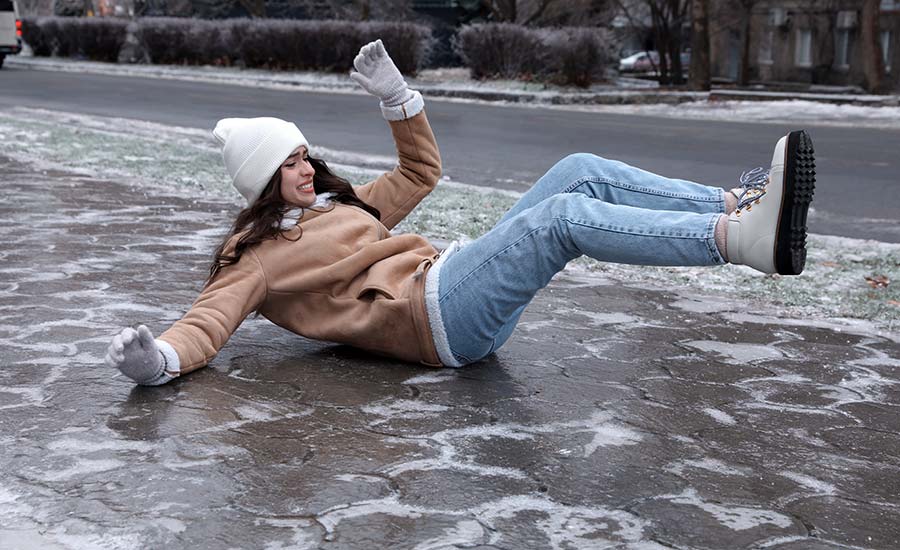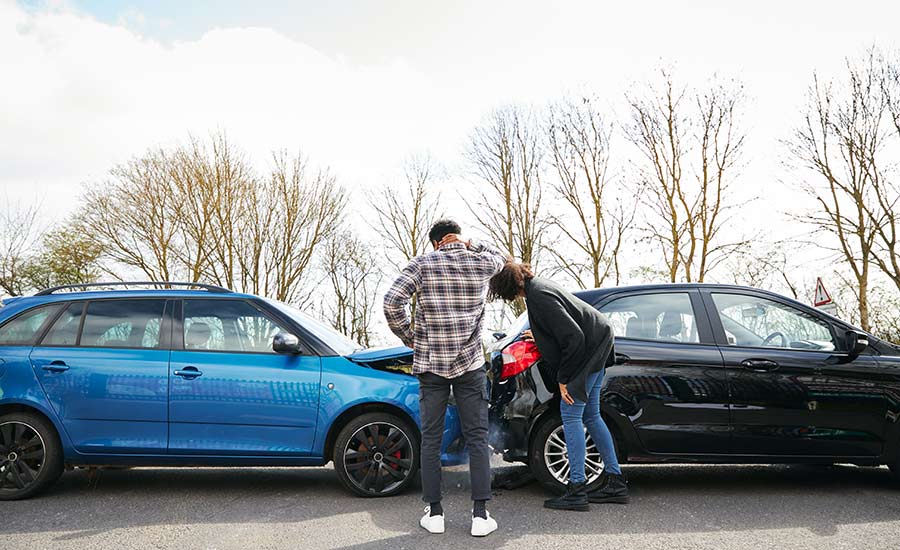

If you were injured while walking on a public sidewalk, you might be wondering whether you have the right to take action against the city or municipality responsible for the sidewalk’s maintenance.
Can you sue the city for falling on a sidewalk? That’s what we’re here to answer.
Find all you need to know about suing the city after a sidewalk accident, along with other parties that could be held liable and what to do immediately after a sidewalk accident.
Plus, we’ll explain how our experienced legal team at Spar & Bernstein can help you pursue compensation after an accident.
Who Is Liable If You Fall On A Sidewalk?
The parties you can hold responsible for your sidewalk accident can vary depending on local laws, but typically, liable parties include:
- A private property owner
- The town or city government
Falling on a sidewalk does not necessarily mean you have a case against the city.
In some states, a private property owner may be held responsible for a sidewalk fall, if the sidewalk is privately owned.
In New York City, for example, as per the New York City Administrative Code (Sec. 7-210), sidewalk safety is the responsibility of the owner whose property borders the sidewalk.
However, there are exceptions. If you fall on a sidewalk in front of a one, two or three family home (which is most residential homes), it is likely the responsibility of the City of New York to maintain the sidewalk.
Since liability is determined on a case-by-case basis, it is important to seek legal advice to determine who is liable in your case.
With five decades of personal injury law experience, including slips and falls, our knowledgeable attorneys at Spar & Bernstein are here to help.
We will listen to your story, determine the cause of the fall, examine the condition of the sidewalk, evaluate the actions of the property owner or the city and advise you of your legal options to seek compensation.
Can You Sue The City For Falling On A Sidewalk?
Yes — if you can prove that the city was responsible for your fall, because they did not keep the sidewalk safe, then you can sue the city for falling on a sidewalk.
To have grounds for a lawsuit against the city, you must prove that:
- The city knew or should have known there was a dangerous condition
- The city did not take actions to eliminate the hazard
- The sidewalk’s dangerous condition was an important factor in your injuries
The first step to suing the city for falling on a sidewalk is to file a Notice of claim informing the city of your accident and injuries, along with your intention to sue them.
The time period you have to file a Notice of claim can vary by state.
For example, in New York, you must submit a Notice of claim within 90 days after your sidewalk fall. Following the Notice of claim submission, you have one year and 90 days after your accident to file a lawsuit.
Common Causes Of Sidewalk Accidents
The most common causes for falling on a sidewalk include:
- Uneven flags
- Cracks or holes in the sidewalk
- Tree roots growing under sidewalks
- Debris, such as fallen tree branches or construction materials
- Slippery sidewalks, due to rain, sleet, spills, fallen leaves, snow or ice
If you suffered injuries after falling on a sidewalk, schedule a consultation with our knowledgeable team at Spar & Bernstein — we will determine your eligibility for filing a lawsuit against the city or another responsible party and fight for compensation on your behalf.

What To Do After Falling On A Sidewalk
While falling on a sidewalk can be both painful and embarrassing, immediately after a fall it’s important to:
- Assess your injuries and seek medical help — a medical report will help you support your lawsuit if you decide to sue the at-fault party
- Document the incident with photos of your injuries and the sidewalk’s condition
- Collect witness contact information
- Report the incident to the property owner or local authorities to ensure that the hazard is addressed and future accidents are prevented
- Schedule a consultation with a trusted personal injury law firm, like our team at The Law Offices of Spar & Bernstein
- Avoid signing anything — the at-fault party or their insurance provider may attempt to convince you not to pursue your case or to resolve the situation quickly by accepting lower compensation
- Keep a record of your doctor appointments, along with your lost wages and emotional condition after your sidewalk fall — this will help your lawyer evaluate your economic and non-economic damages
- Restrain from publishing posts about the incident on social media — public posts could work against you in a lawsuit

Did You Fall On A Sidewalk? Contact Spar & Bernstein
Filing a lawsuit against the city after falling on a public sidewalk can be challenging, as it requires a thorough understanding of the legal system, including:
- The difference between suing a government vs. suing a private entity
- Liability
- Legal deadlines
- The elements your lawsuit must contain, like evidence of your injuries
Our experienced and compassionate lawyers at Spar & Bernstein have helped thousands of people in New York and New Jersey obtain compensation for their injuries and damages.
From suing hospitals and schools to filing lawsuits against a police department or police officers individually, we have a proven track record when it comes to securing compensation for our clients, from both private and public entities.
We’ll determine whether you can sue the city or another liable party, answer any questions or concerns you might have, and fight on your behalf to obtain compensation for your injuries.
Our team will be by your side every step of the way, following up on your case, preparing and filing your lawsuit, negotiating a settlement and, if needed, representing you in court.
Can You Sue The City For Falling On A Sidewalk? FAQs
Still have questions? Find more answers below about suing the city after a sidewalk fall.
1. What damages can you claim after falling on a sidewalk?
Regardless of whether you are suing the city or a private property owner for falling on a sidewalk, you can pursue economic and non-economic damages.
Economic damages include your hospital, treatment and rehabilitation bills, lost income and household help, if necessary.
Non-economic damages include pain and suffering, loss of enjoyment of life, loss of consortium and mental anguish.
2. How much money can you recover when suing the city for a sidewalk fall?
The compensation you can be awarded for falling on a sidewalk is based on multiple factors, such as:
- How serious your injuries are
- How your injuries are affecting or will affect your life, specifically your Instrumental Activities of Daily Living (IADLS) and your Activities of Daily Living (ADLS)
- How long you are not able to work
- How much your medical bills are
3. What kind of proof do you need for a sidewalk fall lawsuit against the city?
When suing the city for falling on a sidewalk, evidence you might need can include:
- Expert witness testimonies regarding medical treatment or the decreased potential to work
- Medical expenses
- Income documents
- Personal notes about your pain and suffering, estrangement or mental anguish
4. What do you need to prove after falling on a sidewalk due to ice and snow?
To sue the city for falling on a sidewalk due to ice and snow, you must prove that:
- The city knew about the dangerous ice conditions
- The city did not take steps to clear the snow and ice within a reasonable time frame
5. What is the statute of limitations for suing the city after falling on a sidewalk?
The statute of limitations, i.e. the time period in which you must file a lawsuit, can vary from state to state. In New York, for example, the statute of limitations is one year and 90 days from the date of the accident
6. Why should you hire a lawyer to sue the city for falling on a sidewalk?
Suing a government entity can be a complex and extensive process. Partnering with an experienced personal injury lawyer will ensure that your lawsuit is filed correctly within the Statute of limitations and includes all of the evidence needed to support your claim.
In addition to handling all of the paperwork for you, your attorney will represent you before insurance companies and the court and fight to obtain maximum financial recovery for your injuries.
7. What can hurt my case against the city after falling on a sidewalk?
Factors that can lead to the weakening or denial of your case include:
- Having suffered minor injuries that did not require medical help
- Being under the influence of alcohol or drugs at the time of the accident
8. How can you avoid falling on a sidewalk?
To avoid falling on a sidewalk:
- Don’t text while walking
- Make wide turns at corners
- Make sure the items you are carrying are not blocking your view
- If the sidewalk is slippery due to wet leaves, snow or ice, walk slowly while shuffling your feet
- When walking up or down staircases, use handrails





